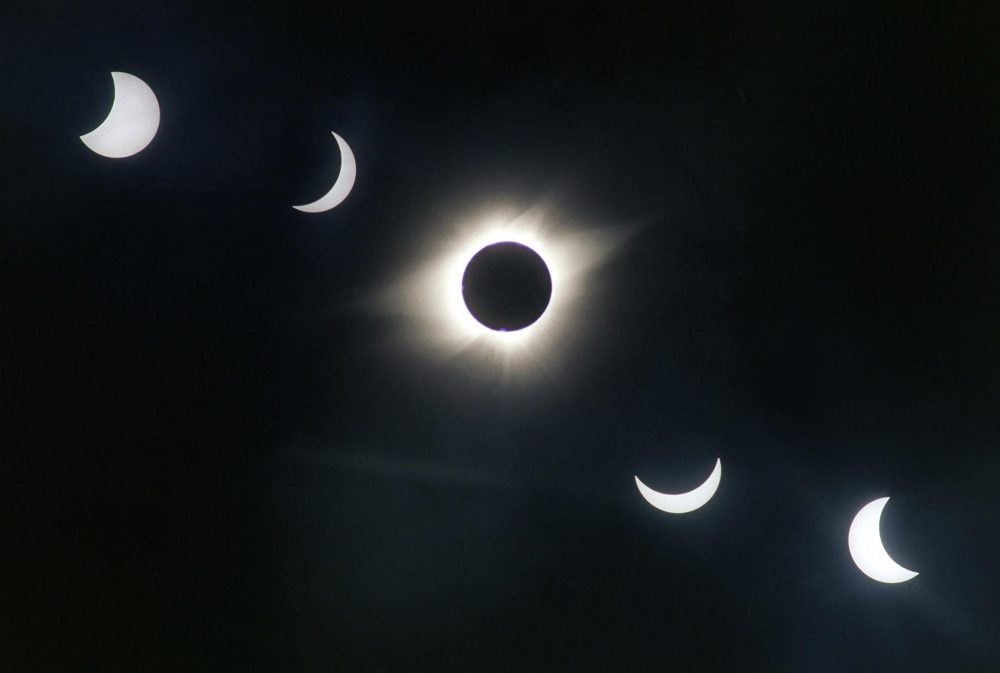Advertisement
Looking At The Solar Eclipse Through The Lens Of History
Resume
On Aug. 21, parts of the United States will experience a total solar eclipse. Before science was able to explain how and why eclipses happened, civilizations came up with their own interpretation.
Bryan Brewer (@eclipsebook2017), author of the book "Eclipse," takes Here & Now's Robin Young on a journey through the mythology, history and science of eclipses — from ancient China to Christopher Columbus to Einstein's theory of relativity.
Interview Highlights
On the first recorded mention of an eclipse
"Well, it was about 4,000 years ago in China, the Chinese astronomers kept accurate records. We have the first actual documentation of an eclipse, I think it was 2134 [B.C.E.]"
On the ancient reaction to the first eclipses
"In ancient times, in Chinese cultures and many other cultures around the world, eclipses were viewed as omens of doom. This was a negative message."
On whether or not ancient scientists could predict eclipses
"The Chinese, mentioned earlier, in 2000 B.C.E., as well as the Babylonian astronomers, kept very accurate records about the movements of celestial objects. The Babylonians, in the same general time frame, were able to come up with this 18-year Saros cycle that astronomers even use today to predict the recurrence of eclipses.
"But, predictions have been somewhat crude, until the middle of the 1800s. Before that, astronomers could get a general sense of maybe what day an eclipse was going to occur, but didn't have much information about where you were going to be able to see a total solar eclipse. That all changed in the mid-1800s, when several things happened: There was a mathematician who came up with some equations that make it much easier to calculate the orbital motion of the moon and the sun, and the earth to be able to predict eclipsee. And then another astronomer spent most of his adult lifetime calculating the paths for total solar eclipses, for a period of about 3,000 years. His name was Theodor von Oppolzer, and he published his canon of solar eclipses in the late-1800s, and with that change, astronomers — and the public as well, who had access to that information — were able to get a much better prediction of when and where a total solar eclipse was going to occur."
"In ancient times, in Chinese cultures and many other cultures around the world, eclipses were viewed as omens of doom. This was a negative message."
Bryan Brewer
On impacts of ancient eclipses
"In 585 B.C., there were two Middle Eastern armies, the Lydians and the Medes. They were in battle one day, and unbeknownst to them in advance, they were right in the path of a total solar eclipse that day. And so, when the moon covered the sun and it went dark, the warring factions took note, and they laid down their arms and they made peace right on the spot."
On a famous eclipse mentioned in the Bible, which we can date
"Yes, it's from Amos, chapter eight, verse nine, that says, 'And on that day, says the Lord God, I will make the sun go down at noon and darken the Earth in broad daylight.' Based on other information about what was going on at the time, historians were able to go back in time, and they were able to fix the date as June 15, 763 B.C.E. And even today, as new historical records come to light that mention eclipses, it's kind of like a time marker that we have for over the millennia, and historians have found it very useful to go back and fix the dates and get a better idea of the chronology of certain events."
On Columbus' experience with eclipses
"On his fourth voyage to the Americas — and this was in 1504 — he got stranded in Jamaica, the natives fed him and his crew for a while, but after a few months, they got tired of it and withheld the food. Columbus knew from his navigational and astronomical tables that there was going to be a total lunar eclipse, and this was on Feb. 29, 1504. And so, shortly before the beginning of the eclipse, he called the natives together and said, 'If you don't resume feeding us, I'll make the moon disappear.' And they scoffed at him at first, and then he retired to his cabin, and sure enough, the moon started to disappear, and the natives relented. They fed him until he got rescued by other ships from Europe."
On how eclipses helped Einstein
"One of the things he postulated in his [theory of relativity] was that light would be bent by gravity. Back then, there was no way to test it on Earth, but they realized that during a total solar eclipse, the light coming from a star that was very near the apparent location of the sun in the sky would actually be bent by passing next to the sun, and you could measure its location during an eclipse. And then months later, when the moon was in a different part of the sky, they could measure the relative position of the star, and sure enough, they proved that the position changed and it was changed just according to what Einstein calculated. So, it was the first empirical proof of the theory of relativity."
This article was originally published on August 15, 2017.
This segment aired on August 15, 2017.